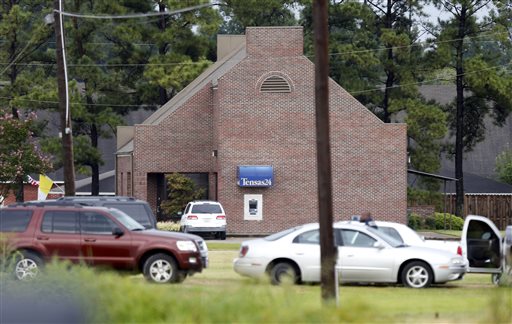ST. JOSEPH, La. - Authorities say a man who took hostages at a bank in rural Louisiana shot the two remaining hostages before being shot and killed by police.
Louisiana State Police superintendent Col. Mike Edmonson says that during negotiations with law enforcement, the suspect - identified as 20-year-old Fuaed Abdo Ahmed - said he was going to kill the hostages. Law enforcement then entered the building just before midnight Tuesday.
Edmonson says that's when Ahmed shot the two hostages in the upper body and then state police shot and killed him. Edmonson says the hostages were taken from the scene in critical condition.
The gunman took two women and a man captive about 12:30 p.m. Tuesday at the Tensas State Bank branch in St. Joseph. He later released one of the female hostages.
Previous story
ST. JOSEPH, La. - A man whose family owns a store across the street from a bank branch in rural Louisiana took three bank employees hostage Tuesday, then released one of them nine hours later as negotiations continued to secure the others' freedom, police said.
Louisiana State Police superintendent Col. Mike Edmonson confirmed the release of a female bank teller late Tuesday. He said authorities were talking with her about ordeal.
Meanwhile, negotiations continued with the hostage-taker, identified only as a 20-year-old man from the community in eastern Louisiana. Police said they have no reason to believe any captive has been hurt.
"We feel like we're being productive," Tensas Parish Sheriff Rickey Jones said. "The negotiators are doing a good job."
Edmonson said earlier Tuesday that the man has been calm and has made some demands, but the police official would not describe the demands or further identify the gunman.
"We're still working with him to determine exactly what his intent is," Edmonson said.
The gunman, carrying at least a handgun, took two female employees and a man captive about 12:30 p.m. at the Tensas State Bank branch in St. Joseph, and a negotiator talked with him throughout the afternoon, said state police spokesman Trooper Albert Paxton.
The red-brick bank is just off Louisiana Highway 128, a rural stretch of road cutting through cornfields. It is across the street from Trak convenience store, which the gunman's family owns, in St. Joseph, the seat of Tensas Parish.
Edmonson warned that the standoff could last for some time.
"Our utmost concern right now more than anything else is the safety of those hostages," he said.
More law enforcement people and equipment will be brought in. "This is a fluid situation. We've got to be prepared to act," Edmonson said.
Before the hostage's release, Edmonson told CNN that negotiations were continuing with the man, who he said was originally from California. He said he believed the hostages were safe but that the man remained armed and dangerous.
"We're negotiating with him," Edmonson said. "We're talking with him. We've been on the phone with him. We actually talked to the hostages there. Nothing is more important to me than the safety of those hostages. That's why it's a fluid situation."
He said some of the suspect's relatives tried to approach the scene and that authorities are now working with them.
Mayor Edward Brown said that, as a general rule, the town's most notable crimes are the occasional drug busts, and some residents are so frightened about what's happening that they've left town.
"It's a quiet town. Very little crime. So this is amazing," Brown said.
The town of 1,200 is near the Mississippi River, downriver from Vicksburg, Miss., in northeast Louisiana.
Paxton said he believed that the Trak convenience store was evacuated, but there were few other occupied buildings within the perimeter that state police and the FBI set up.
Richardo Miles, a 25-year-old farmworker, said he lives about a half-mile from the bank. He sat on his bicycle at a roadblock near an abandoned hardware store about a quarter-mile away, watching the activities of dozens of first responders, including paramedics and heavily armed men in camouflage.
A helicopter circled overhead in the overcast sky for a time as men, some carrying assault rifles, gathered in the street in front of the bank. Law enforcement trucks also hauled in construction lights, apparently to prepare in case the standoff lasted into the night.
The sight of the state police bomb squad and SWAT team unnerved many people in the sleepy farm town, Miles said.
"It's kind of startling for the residents. We're not accustomed to this kind of activity," said Miles. "Some people are pretty scared. They're nervous."
Tensas Parish lies along Mississippi River, but St. Joseph is about a mile from the riverbank and about two miles from a 3,000-acre oxbow lake that long ago was one of the river's bends. Nearly one-third of the parish's 5,000 residents live under the federal poverty level, according to U.S. Census figures. Farmland makes up more than 45 percent of the 600-square-mile parish, with most of it in cotton, feed grains, soybeans and wheat.
A helicopter circled overhead in the overcast sky for a time as men, some carrying assault rifles, gathered in the street in front of the bank. Law enforcement trucks also hauled in construction lights, apparently to prepare in case the standoff lasted into the night.
The sight of the state police bomb squad and SWAT team unnerved many people in the sleepy farm town, Miles said.
"It's kind of startling for the residents. We're not accustomed to this kind of activity," said Miles. "Some people are pretty scared. They're nervous."
Tensas Parish lies along Mississippi River, but St. Joseph is about a mile from the riverbank and about two miles from a 3,000-acre oxbow lake that long ago was one of the river's bends. Nearly one-third of the parish's 5,000 residents live under the federal poverty level, according to U.S. Census figures. Farmland makes up more than 45 percent of the 600-square-mile parish, with most of it in cotton, feed grains, soybeans and wheat.

